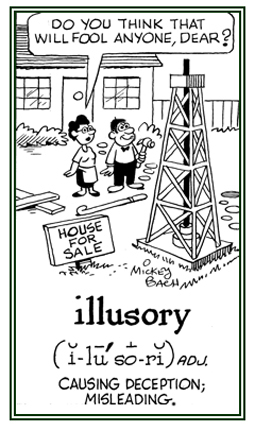-ory
(Latin: a suffix of adjectives ending in -ory; of or relating to; like; resembling)
elevatory (adjective), more elevatory, most elevatory
Referring to a tendency to rise or to increase: The doctor was concerned about Mary's elevatory blood pressure.
elusory (adjective), more elusory, most elusory
1. The nature of an evasion or subterfuge: During the police interview, the suspect gave the most elusory answers to even the most basic questions.
2. As an object of thought; slipping from the grasp; misleading; fallacious; deceitful; that which one cannot "get hold of": Sharon had an elusory memory of happy days when she was in elementary school.
2. As an object of thought; slipping from the grasp; misleading; fallacious; deceitful; that which one cannot "get hold of": Sharon had an elusory memory of happy days when she was in elementary school.
exclamatory (adjective), more exclamatory, most exclamatory
Descriptive of utterances or expressions of feelings that are outspoken, excited, or very enthusiastic: The more exclamatory remarks of the movie star were highlighted in a newspaper article, much to the delight of her fans.
exculpatory
1. Clearing someone of guilt or blame.
2. Clearing or tending to clear someone from an alleged legal fault or guilt; excusing.
3. Applied to evidence which may justify or excuse an accused defendant's actions and which will tend to show the defendant is not guilty or has no criminal intent.
4. Etymology: from Middle Latin exculpatus, past particple of exculpare, from Latin ex culpa, from ex-, "from" + culpa, "blame".
2. Clearing or tending to clear someone from an alleged legal fault or guilt; excusing.
3. Applied to evidence which may justify or excuse an accused defendant's actions and which will tend to show the defendant is not guilty or has no criminal intent.
4. Etymology: from Middle Latin exculpatus, past particple of exculpare, from Latin ex culpa, from ex-, "from" + culpa, "blame".
Something exculpatory frees a person from accusations; in other words, exculpatory evidence helps to prove that an accused individual is not guilty.
expiratory (adjective), more expiratory, most expiratory
extrasensory (adjective), more extrasensory, most extrasensory
1. Referring to something that is beyond the normal function of a person's feelings or perceptions: Helen's more extrasensory ability to predict the future was amazingly accurate.
2. Concerning something that can be sensed without the need for hearing, seeing, touching, tasting, or smelling: Mark has an unusual extrasensory talent in perceiving things without the need to utilize his normal physical perceptions.
2. Concerning something that can be sensed without the need for hearing, seeing, touching, tasting, or smelling: Mark has an unusual extrasensory talent in perceiving things without the need to utilize his normal physical perceptions.
fecundatory (adjective), more fecundatory, most fecundatory
1. Relating to the process of producing offspring or children via impregnation, etc.
2. A reference to the act of making fertile or greatly productive:
2. A reference to the act of making fertile or greatly productive:
- A fecundatory soil is rich in materials necessary for initiating or sustaining plant growth.
- The fecundatory animal is capable of producing its species.
- A fecundatory mind or mental inventions are rich in various activities.
funambulatory (adjective), more funambulatory, most funambulatory
Pertaining to, or referring to, rope-walking: Norbert was showing his skills at a circus as a funambulatory performer.
hallucinatory
illusory (adjective), more illusory, most illusory
Produced by, based on, or having the nature of a mistaken perception of reality: Tom's florid and illusory language made his audience believe that beauty existed even in the town dump.

© ALL rights are reserved.
Go to this Word A Day Revisited Index
A world without color appears to be missing crucial elements
Colors not only enable us to see the world more precisely, they also create emergent qualities that would not exist without them.
Many people believe that color is a defining and essential property of objects, one depending entirely on the specific wavelengths of light reflected from them.
- Color is a sensation created in the brain.
- If the colors we perceived depended only on the wavelength of reflected light, an object's color would appear to change dramatically with variations in illumination throughout the day and in shadows.
- Instead, patterns of activity in the brain render an object's color relatively stable despite changes in its environment.
- The pathway in the brain that serves navigation and movement is essentially color-blind.
- People who become color-blind after a stroke appear to have normal visual perception otherwise.
- The study of illusory colors (colors that the brain is tricked into seeing) demonstrates that color processing in the brain occurs hand in hand with processing of other properties; such as, shape and boundary.
- Visual perception begins with the absorption of light; or, more precisely, the absorption of discrete packets of energy called photons; by the cones and rods located in the retinas of the eyes.
- A cone photoreceptor responds according to the number of photons it captures, and its response is transmitted to two different types of neurons, termed on and off bipolar cells.
- These neurons in turn provide input to on and off ganglion cells that sit side by side in the retina.
- About 40 percent or more of the human brain is thought to be involved in vision.
- Visual signals disperse to more than 30 different areas, interconnected by more than 300 circuits.
- The complexity of color illusion suggests that it is unlikely to result from a single unitary process, but may represent an attempt by the brain to reconcile competing signals from multiple specialized pathways.
- The study of illusory colors demonstrates that the perception of color in the brain generates emergent properties of form and depth.
- Ongoing research about illusory colors will continue to offer a tantalizing portal into the complexities of the human visual system.

Go to this Word A Day Revisited Index
so you can see more of Mickey Bach's cartoons.
inculpatory
1. To incriminate.
2. Causing blame to be imputed to.
2. Causing blame to be imputed to.
inflammatory (adjective), more inflammatory, most inflammatory
Descriptive of something which tends to arouse anger, hostility, passion, etc.: The politician kept making inflammatory speeches against his opponent.

© ALL rights are reserved.

© ALL rights are reserved.
Go to this Word A Day Revisited Index


Go to this Word A Day Revisited Index
so you can see more of Mickey Bach's cartoons.
introductory (adjective)
Serving, or used, to introduce; preliminary; beginning: "The professor presented his introductory course in linguistics."
1. A detailed list of articles, such as goods and chattels, or parcels of land, found to have been in the possession of an individual at his decease or conviction: An inventory sometimes includes a statement of the nature and value of each item, hence any such detailed statement of the property of a person, of the goods or furniture in a house or messuage, or the like.
2. A company’s assets as a whole, or the value of them: The store was closed for two days due to the yearly inventory in order to list all the items and their monetary worth.
2. A company’s assets as a whole, or the value of them: The store was closed for two days due to the yearly inventory in order to list all the items and their monetary worth.
lacrimatory
1. A "tear-bottle;" a narrow-necked vessel found in sepulchers of the ancient Romans; so called from a former notion that the tears of the deceased person's friends were collected in it.
2. Pertaining to, or causing the production and shedding of tears.
2. Pertaining to, or causing the production and shedding of tears.


